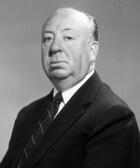
Alfred Joseph Hitchcock (London, August 13, 1899-Los Angeles, April 29, 1980) was a British film director, producer and screenwriter. A pioneer in many of the techniques that characterize the film genres of suspense and psychological thriller, after a successful career in British cinema in silent and early sound films, which led him to be considered the best director in England, Hitchcock moved to Hollywood in 1939.
Throughout a career that spanned more than half a century, Hitchcock shaped a distinctive and highly recognizable style of filmmaking. He was innovative in his use of the camera to imitate a person's gaze, thereby forcing viewers to engage in a certain form of voyeurism, he used framing to provoke anxiety, fear, or empathy, and he developed a novel form of film montage. His stories often feature fugitives from the law, and his lead actresses are often blonde-haired. Many of his films feature plot twists at the end and disturbing plots that revolve around violence, murder, and crime. . Frequently, the mysteries that articulate the plots are nothing more than decoys (Macguffin, as the director himself called them) that serve to advance the story but have no major importance in the plot. Hitchcock's films also often deal with themes of psychoanalysis and have strong sexual overtones. Thanks to cameos in many of his films, interviews, trailers for his films and the television show Alfred Hitchcock Presents, the filmmaker became a cultural icon.
Hitchcock directed more than fifty films over six decades. He is often recognized as the best British filmmaker; he appeared first in a 2007 poll of film critics by The Daily Telegraph newspaper. The newspaper defined it thus: "Undoubtedly the greatest filmmaker born on these islands, Hitchcock did more than any other director to shape modern cinema, which would have been completely different without him." MovieMaker magazine has described him as the most influential director of all time and he is widely considered one of the greatest artists in the seventh art.




